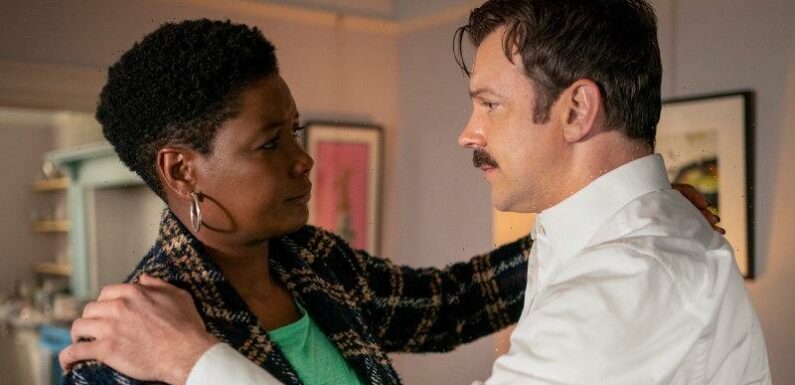
“Sessions typically last 50 minutes.”
“But you charge by the hour, right?”
It’s the second season of Ted Lasso, and Coach Ted and Dr Sharon are making a second attempt at a therapy session, Ted having panicked and bolted from the first. Dr Sharon is incorporating 10 minutes into her fee for writing records, developing a treatment plan and, in Ted’s case, presumably recovering from the spite he dishes out during sessions. I watched the episode with another doctor and we shared a weary glance of recognition.
Dr Sharon Fieldstone and Ted Lasso in a therapy session. Credit:APPLE TV +
Accusing Dr Sharon of overcharging is rich coming from Ted, who spends his salaried days planning a sandwich-exchange program, playing keepie-uppies with waste paper and riding on the groundskeeper’s mower. It’s all part of his folksy entitlement. But any minute that she, a healthcare worker, spends not visibly tending to his needs is not valid as work at all.
Ted’s stingy attitude is the same one that GPs, in particular female GPs, receive from governments, some patients, and even our own colleagues. General practice, chronically underfunded, is the women’s work of medicine and women in general practice are the most womanly of all. Research consistently shows that female GPs earn less than male. More accurately, they do more unpaid work.
Female GPs interrupt less and manage more issues per consultation – the medical equivalent of a mother juggling household obligations, work and everyone’s dental appointments and emotional wellbeing. Of course, there are compassionate, courageous male doctors who don’t duck the difficult, unrewarded medicine, and female doctors who do. My GP is a man and the most intuitive listener I’ve ever met.
It’s cathartic and groundbreaking to see a powerful man seek help with his mental health, but why do we accept his undervaluing of the woman providing it?Credit:APPLE TV+
But Ted and Sharon’s dynamic is probably familiar to anyone who works in the “helping” professions. (The name is a social phenomenon in itself. What job should exist that doesn’t help?) Sharon sees that Ted is suffering, but he declines her offers of help until he decompensates in her office in a midnight panic attack. It’s cathartic and groundbreaking to see a powerful man seek help with his mental health, but why do we accept his undervaluing of the woman providing it?
Ted usually places a premium on politeness but calls Sharon’s work “bullshit” and berates her for expecting him to “spill my guts about the gory details of my life”, despite the fact he came to her in desperation. He accuses her of not knowing him well enough; essentially, not mothering him enough. “You scared me, Ted,” she says. He doesn’t respond, and lashes out at her as punishment for not being a willing receptacle for his unprocessed pain. He expects her to be available to him in a form that is unconditional, non-threatening and underpaid.
There’s a reason GPs are burning out and you can’t get an appointment, especially when general practice runs on 6 per cent of health expenditure. Our medical system was developed for a 70-kilogram white man and GPs must twist that tool into something from which they can extract benefit for children, women, people of colour, and men who weigh more or less than 70 kilograms.
When you have to choose – every consultation – whether this will be where you’ll spend the last of your energy, whether you can bear to hear again about the manipulation/poverty/rape/abuse/abandonment/bigotry/chronic pain, for which the system will allow you to do very little, after a few years you must choose between reducing your empathy or your hours. Doctors, especially female doctors, are significantly more likely than the general population to die by suicide.
A colleague recently stepped into a job vacated by a male, older doctor. The families are complex, poor, geographically and socially isolated and deeply traumatised. She does the needful – addresses the social, emotional, financial, logistical things that contribute most of their suffering, an invaluable action from someone who can frame the medical among everything else. “You listen!” they marvel. They have never had anyone try to address the reality of their lives.
But the work has been left undone for years. She has opened the floodgates and the job has collapsed on her. Crushed by the backlog, she will burn out, the families will lose, again, and her exit will be attributed to “not having what it takes”. Of course, she has what it takes. What she’s questioning is whether she can or wants to be a female GP – that is, meet the exponentially rising demands for her expertise and empathy in an environment that blames her for struggling under the workload that society generates, male doctors are often permitted to ignore, and nobody wants to pay for.
When I call general practice the women’s work of medicine, I mean it is one of the frontline, back-breaking, invisible jobs holding the country together. If we don’t support general practice, we end up with ramped emergency departments and people decompensating alone in offices at midnight.
One of Lasso’s catchphrases is “I appreciate you”. He is apparently an open-minded feminist, full of self-awareness puns. “I can’t control my emotions!” whines player Roy Kent. “Well, by all means, let your emotions control you!” teases Ted. Yet he has a “healthy Midwestern scepticism” about therapy – presumably he is sceptical about therapy in which he’s the one learning, and the one paying.
While we celebrate the wonderful moments of male vulnerability in the show, let’s also allow the people who facilitate them to invoice us. And if Dr Sharon returns in the third season, I hope she continues to charge for the 10 minutes.
The Opinion newsletter is a weekly wrap of views that will challenge, champion and inform your own. Sign up here.
Most Viewed in Culture
From our partners
Source: Read Full Article

